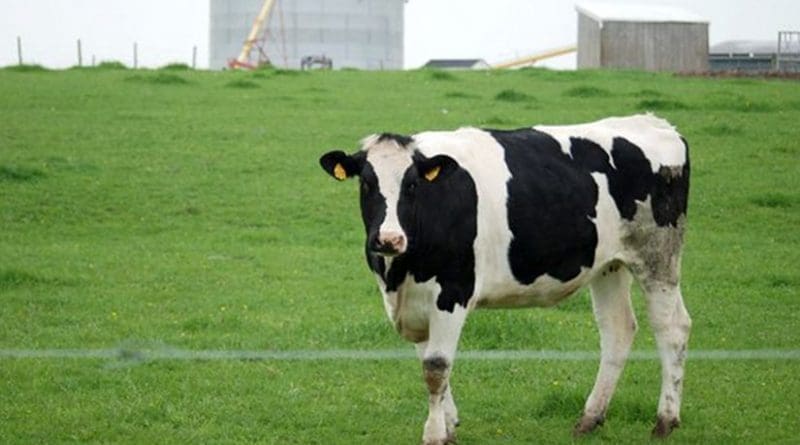Cattle Treated With Antibiotics Results In Doubling Of Dung Methane Emissions
An international team of scientists have published a study that highlights how antibiotics given to cattle can have far-reaching effects on an ecosystem, with increased methane emissions from dung, as well as changing the composition of microbes in the guts of dung beetles.
Publishing in ‘Proceedings of the Royal Society B’, a journal of The Royal Society, the international team comprising scientists from the US, the UK, Finland and Sweden, have argued that there may be ‘unintended, cascading ecological effects’ from the use of antibiotics in agriculture. Antibiotics are commonly given to livestock in order to prevent disease and stimulate animal growth.
The research team treated cattle with and without a broad spectrum antibiotic, tetracycline. They analyzed microbial communities in cow dung and in field-collected dung beetles. They examined the effects of antibiotics on the size of the beetles and their numbers, and tested the greenhouse gases that were emitted from the cow dung.
The team discovered that the dung produced by treated cows produced nearly twice as much methane as that of non-treated cattle. Levels of nitrous oxide also rose, whilst carbon dioxide emissions are described as similar between the two treatments.
“We were surprised to find such a big increase in methane emission in dung,” said Tobin Hammer of the University of Colorado in Boulder. “We believe that the tetracycline treatment favors the growth of methanogenic archaea in the cows’ intestinal tract by reducing the bacteria in the gut.”
Importantly, they also discovered that the antibiotics also caused a change in composition of the gut microbes of beetles that fed on the cattle dung. Although these changes didn’t kill the beetles, affect their growth or prevent them from reproducing, Anne Lizé, a researcher at France’s University of Rennes, commented that they could alter their behavior and sense of smell.
“The disruption of microbiota could lead to indirect behavioral effects that happen not only in the focus organism – the one that has been administered an antibiotic – but also in related communities living in or around it,” she said. However, it is important to note that these changes were not directly monitored in the study.
The scientists’ findings also indicate that the extensive use of antibiotics in agriculture can lead to antibiotic resistance, seen as a growing and urgent issue by the World Health Organization. They argue that the use of antibiotics can favor the evolution of antibiotic resistance among pathogens and the spread of antibiotic genes to surrounding environments.
Following the publication of the study, the research team are now calling for much larger studies to be conducted to compare the effects of dung (and cow belching) in terms of their greenhouse gas emissions, as well as to study ‘the global extent and purpose of antibiotic use in livestock production.’
Source: CORDIS, based on media reports

